Top Rankings
Arlington School District ranks among the top 20% of public school district in Massachusetts for:
Category
Attribute
Overall Rank
Highest overall rank (Top 10%)
Math Proficiency
Highest math proficiency (Top 10%)
Reading/Language Arts Proficiency
Highest reading/language arts proficiency (Top 10%)
Science Proficiency
Highest science proficiency (Top 10%)
Community Size
Largest student body (number of students) (Top 1%)
For the 2025 school year, there is 1 public preschool serving 79 students in Arlington School District.
Public Preschools in Arlington School District have a diversity score of 0.67, which is less than the Massachusetts public preschool average of 0.68.
Minority enrollment is 49% of the student body (majority Asian), which is less than the Massachusetts public preschool average of 53% (majority Hispanic).
Overview
This School District
This State (MA)
# Schools
11 Schools
567 Schools
# Students
5,997 Students
205,303 Students
# Teachers
492 Teachers
17,796 Teachers
Student : Teacher Ratio
12:1
12:1
District Rank
Arlington School District, which is ranked within the top 10% of all 393 school districts in Massachusetts (based off of combined math and reading proficiency testing data) for the 2021-2022 school year.
The school district's graduation rate of 95% has stayed relatively flat over five school years.
Overall District Rank
#27 out of 397 school districts
(Top 10%)
(Top 10%)
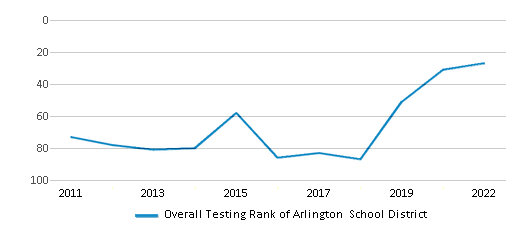
Math Test Scores (% Proficient)
69%
41%
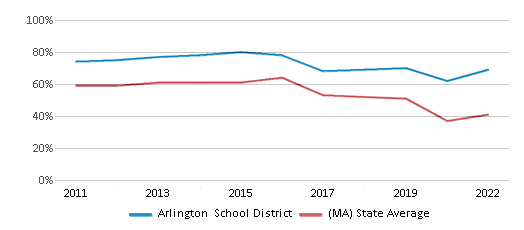
Reading/Language Arts Test Scores (% Proficient)
70%
44%
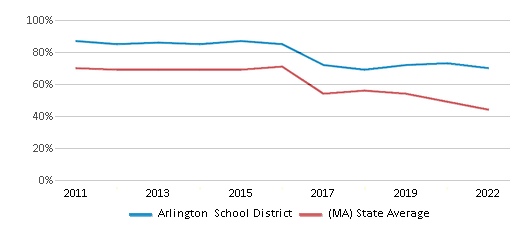
Science Test Scores (% Proficient)
70%
44%
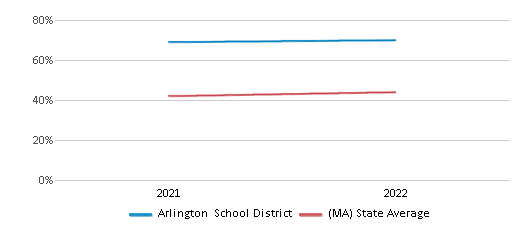
Graduation Rate
95%
90%
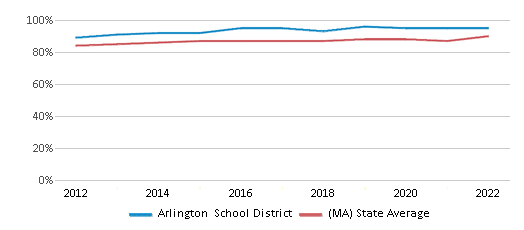
Students by Ethnicity:
Diversity Score
0.54
0.68
# American Indian Students
4 Students
495 Students
% American Indian Students
n/a
n/a
# Asian Students
774 Students
11,779 Students
% Asian Students
13%
6%
# Hispanic Students
475 Students
61,622 Students
% Hispanic Students
8%
30%
# Black Students
192 Students
25,280 Students
% Black Students
4%
12%
# White Students
3,958 Students
95,698 Students
% White Students
66%
47%
# Hawaiian Students
4 Students
173 Students
% Hawaiian Students
n/a
n/a
# Two or more races Students
541 Students
10,168 Students
% of Two or more races Students
9%
5%
Students by Grade:
# Students in PK Grade:
79
31,316
# Students in K Grade:
434
33,369
# Students in 1st Grade:
497
30,795
# Students in 2nd Grade:
487
28,908
# Students in 3rd Grade:
482
23,512
# Students in 4th Grade:
476
22,524
# Students in 5th Grade:
524
18,693
# Students in 6th Grade:
468
7,489
# Students in 7th Grade:
493
3,111
# Students in 8th Grade:
448
3,363
# Students in 9th Grade:
432
606
# Students in 10th Grade:
391
525
# Students in 11th Grade:
388
528
# Students in 12th Grade:
398
485
# Ungraded Students:
-
79
District Revenue and Spending
The revenue/student of $22,863 in this school district is less than the state median of $23,845. The school district revenue/student has stayed relatively flat over four school years.
The school district's spending/student of $20,226 is less than the state median of $24,602. The school district spending/student has stayed relatively flat over four school years.
Total Revenue
$137 MM
$21,850 MM
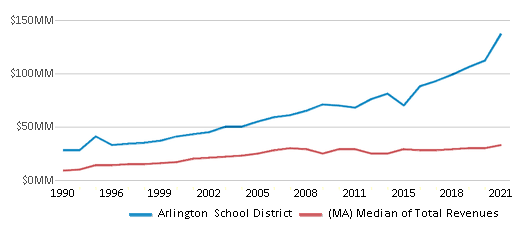
Spending
$121 MM
$22,544 MM
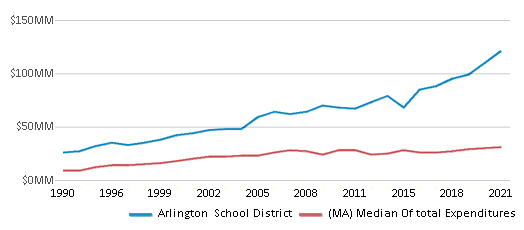
Revenue / Student
$22,863
$23,845
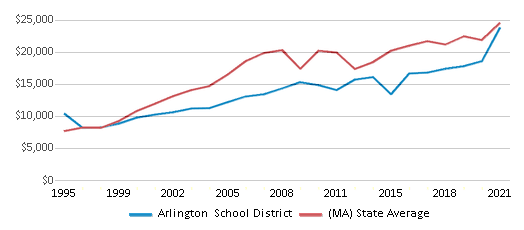
Spending / Student
$20,226
$24,602
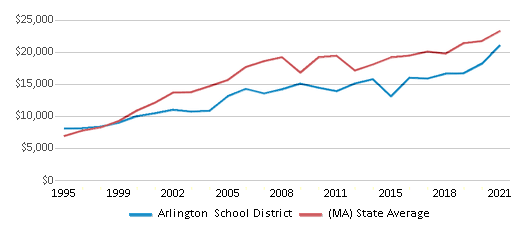
Best Arlington School District Public Preschools (2025)
School
(Math and Reading Proficiency)
(Math and Reading Proficiency)
Location
Grades
Students
Rank: n/an/a
17 Irving Street
Arlington, MA 02476
(781) 316-3698
Arlington, MA 02476
(781) 316-3698
Grades: PK
| 79 students
Recent Articles

Sexual Harassment at Age 6: The Tale of a First Grade Suspension
A six-year old in Aurora, Colorado, was suspended after singing an LMFAO song to a little girl in his class and reportedly “shaking his booty.” We look at the case and the sexual harassment problem in public schools today.

How Scaffolding Could Change the Way Your Child Learns
This article explores the concept of instructional scaffolding, a teaching method that enhances learning by breaking down complex tasks into manageable parts. It highlights how scaffolding supports students in developing critical thinking skills and becoming more independent learners. The article discusses the benefits of scaffolding, including improved engagement and reduced anxiety, and provides strategies for its implementation across various educational levels.

February 05, 2025
Understanding the U.S. Department of Education: Structure, Impact, and EvolutionWe explore how the Department of Education shapes American education, from its cabinet-level leadership to its impact on millions of students, written for general audiences seeking clarity on this vital institution.





